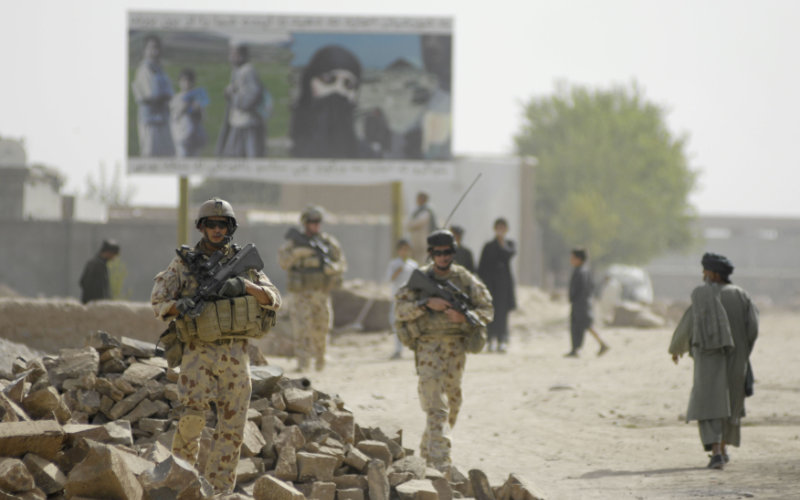
Afghanistan has joined Australia’s list of lost wars, and it’s our longest. The Prime Minister’s tears on announcing it may have been for that, or for Australia’s 41 dead, 249 wounded, estimated 500 veteran suicides, and innumerable cases of PTSD, at a cost of A$10 billion.
Perhaps he wept not with sorrow, but pleasure that the remaining few are coming home, to ratings-boosting ceremonies and photo ops. Or was he relieved that even sooner, it will be ANZAC Day? Whatever it was, Australia’s retreat from Afghanistan will cast a solemn but convenient pall of khaki over the war crimes, sex scandals, funding rorts, and vaccination shortfalls which have been seismic for the government in recent weeks.
Announcing the retreat, Morrison revived the reassuring script, saying ‘Freedom is always worth it’. It was an echo of Secretary of State Albright who callously said the same about children killed in the Iraq invasion. He wasn’t asked ‘Freedom for what, or from what? Whose freedom?’
Under the victorious Taliban, the Afghan people will not be free, except from foreign invaders. Australia, lacking the independence to cut its losses and get out in 2005, is not freed from its self-imposed alliance obligations. The West is not free of Islamist terrorism, and is still less free from right-wing extremist terrorism. Punitive sanctions make trade less free than it was before the war.
Neil James was asked would Afghanistan be in a worse state if we hadn’t gone to war there. The head of the Australian Defence Association made the astonishing claim that Afghans were now ‘probably better off’. By 2019, Afghanistan had lost an estimated 150 000 civilians, military, and Taliban fighters, according to Brown University’s reputable Cost of War project. Internally displaced Afghans numbered 4 million, and another 2.6 m Afghans were refugees. Any social and educational gains previously achieved in the cities had been lost – and probably any empathy with the US, NATO or Australia in bombed villages.
When James added, ‘The Diggers didn’t die in vain, because they tried’, he exemplified the Australian habit of not asking why we fought, only how we fought. It has been identified in P&I by Henry Reynolds, historian of Australia’s ‘unnecessary wars’. Our governments don’t count the cost of wars and report them to Parliament or to the taxpayers. Nor do they explain in advance why our troops would be fighting, or for what. If they did, citizens might well revolt against losing yet another illegal, expeditionary, purposeless war.
A clear strategy to achieve a definite outcome is what soldiers since Sun Tzu have known is essential in war. Retired General Peter Leahy argues that in Afghanistan neither mission nor ‘end state’ was defined. In future conflicts, Australians should know the reason they are going and ‘what does victory look like’, he told The Australian. For once, Foreign Editor Greg Sheridan agreed: Australia ‘never had a strategic purpose in Afghanistan except to show the Americans we were good allies’.
Avoiding that obvious purpose, historian John Blaxland sticks to the script: the war was ‘originally intended to remove al-Qaeda from Afghanistan’. The Lowy Institute’s Rodger Shanahan argues that Afghanistan, for John Howard in 2001 and 2005, ‘ wasn’t a war of choice – you had to do something’. What Australia could have done, and probably did, was ask the Americans after the decline of al-Qaeda in 2011, and the demise of the IS Caliphate in 2018, how much longer the war had to be fought.
If our leaders were told the truth, we could have got out then. If they were told lies, we should have done the same, as should the UK and Canada, whose losses are greater than Australia’s.
But they all knew, because the Afghanistan Papers published by the Washington Post in 2019 revealed to the world that (just as in Vietnam) the US military, along with civilian political leaders, persistently lied to Americans about the state of the war and the prospects for success.
The US will withdraw from Afghanistan the remaining 3,500 of its troops, which peaked in 2011 at 100,000. America has spent US$2 trillion on the war in Afghanistan. US dead total 2,218, with 20,100 injured. In the US, more than 6,000 veterans take their own lives every year — more than 17 a day.
Veterans are reported to be joining ultra-right organisations in significant numbers.
An estimated 241,000 people have died as a direct result of the war, according to Brown University’s Watson Institute for International and Public Affairs and Boston University’s Frederick S. Pardee Center for the Study of the Longer-Range Future.
Withdrawal from Afghanistan doesn’t mean Australia shutting down potential criminal cases. The Brereton report revealed ‘credible information’ of war crimes committed by 25 Australian
soldiers involving the deaths of 39 Afghans, widespread breaches of laws and customs of war, systemic coverups, and a deeply toxic culture within the SAS. Although this could compromise Australia’s record in Afghanistan, Morrison said the troop withdrawal ‘wasn’t the time’ to talk about it, as we concentrated on our war heroes. If the withdrawal process takes from May to September, no time will be appropriate to do so. Are the war crimes to be buried?
If this happens, Australia will have learnt nothing from the Afghanistan war and will be ready and willing to fight the next one. Professor Blaxland expresses the mild hope that In future governments will explain their purpose to Parliament. Citizens should demand more: a debate and a vote in advance of any future expeditionary war.




